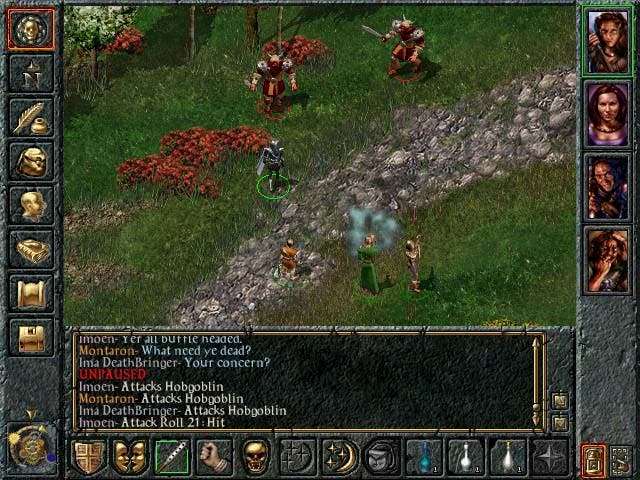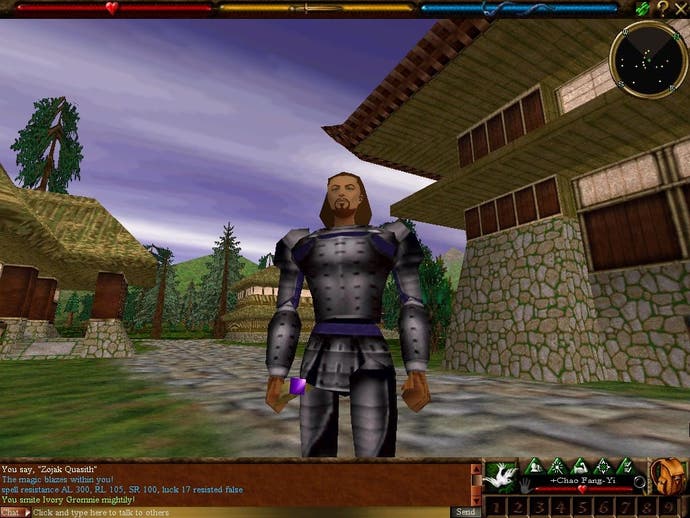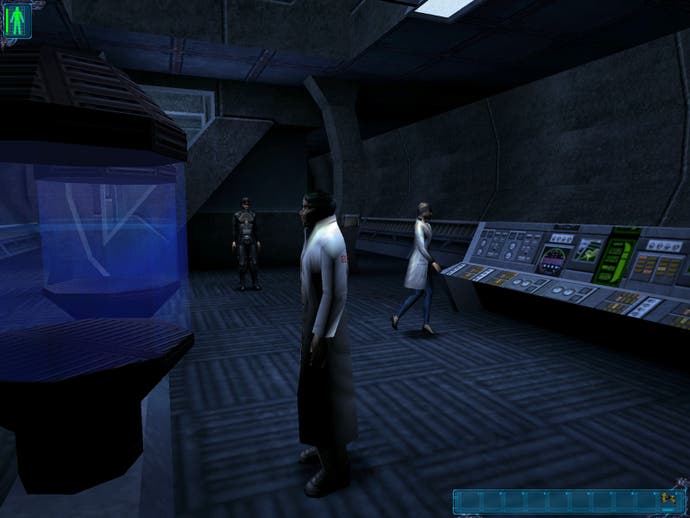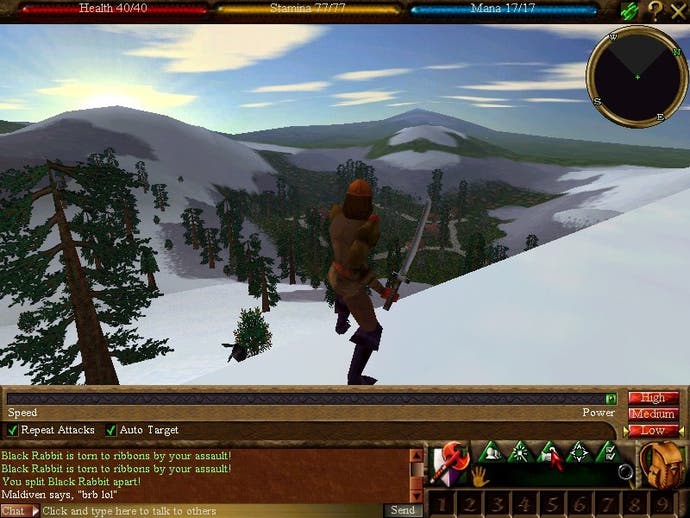D&D - DND
Time for something new in RPGs?
Role playing games are undergoing something of a resurgence at the moment, with single player games like Planescape Torment and Baldur's Gate making the charts, and online worlds like Everquest and Asheron's Call bringing a whole new audience to RPGs.
But despite all the advances in technology, at the end of the day the vast majority of computer RPGs are still dominated by the influence of one game - Dungeons & Dragons, a pencil and paper RPG that is now almost three decades old...

Are You Experienced?
One of the most fundamental parts of any RPG is its experience system, the method by which players advance their character's abilities. After all, without some form of experience and character development system, an RPG would just be a glorified action-adventure game with delusions of grandeur.
Most RPGs I have played over the last decade have had the same basic experience system though, inherited almost verbatim from the original D&D and its successors.
You find treasure, kill monsters, and complete quests, and for this you gain Experience Points (XPs). When you reach a certain number of XPs your Level increases, and you gain Hit Points and abilities. Sometimes you get to choose which skills you acquire, but often it is mostly fixed in advance by the rules of the game. Your weapon proficiencies increase, you get to choose another level 2 spell, you get 20 thief skill points to share amongst your lock-picking and shadow hiding skills, etc...
The higher your Level, the more XPs you generally need to advance to the next Level, giving a rather crude relationship between risk and reward.
The other main part of character development is Class. When you first start the game you choose which Class your character will be - fighter, mage, priest and thief are the most common choices, with minor additions and variations from game to game.
Sometimes you also get to choose which Race you are, although this rarely has much more than a cosmetic effect. Sometimes your choice of Race will limit your choice of Class, influence other characters' reactions to you, or effect your eyesight (infravision for elves is a perennial favourite), but that's about as far as it goes.
After almost thirty years, is this really the best we can do?

Happy Campers
Many online RPGs tinker with this system. For example, in Asheron's Call there is an "Adventurer" Class that is totally customisable by the player. And whichever Class you choose, you can spend XPs on increasing your abilities and skills without having to wait to go up a Level. But the basics remain essentially the same.
One of the biggest problems that online RPGs in particular suffer from at the moment is "camping". Players know where monsters are going to respawn, and they just go there and kill them over and over again, endlessly picking up the same treasure and experience bonuses. Needless to say this increases your Level rapidly but can be mind-numbingly dull.
Developers have tried to find ways around this, but none of their attempts have really succeeded. Everquest in particular suffers from camping, and you can often find a long queue of players waiting to kill a particular monster! Tinkering with the details clearly isn't working so far. Surely the real problem is the antiquated experience system that encourages this kind of behaviour in the first place?
At the moment players get the same number of XPs every time they carry out a task, however often they do it. It simply requires more and more repetitions to increase their abilities as the character advances through the game, because they need more XPs to advance to the next Level.
Why not turn the whole experience system on its head? Have the XP needed to reach the next Level remain constant throughout the game, but give the player less and less XPs the more times they repeat the same action.
This instantly solves the problem of camping, as once you have killed the same type of creature many times already, or completed the same subquest over and over again, the XP reward of doing it another time becomes inadequate to compensate for the risk involved and the time expended.
Instead of camping and killing the same monsters over and over again, players will be encouraged to go out and explore, to find new challenges which will reward them with more XP, and so help boost their character more rapidly. Players will actually be awarded experience points for seeking out new experiences. What a novel concept...

Pure Class
The other problem that I at least have with most RPGs is that you are usually locked into fixed professions from the moment you start the game.
If you are a fighter you can't learn magic, but if you are a magician you can never learn to wield a sword. Why not? Why should I be limited to the designers' preconceptions of what a magician or a fighter is? Why can't I have a character who can do a bit of both?
Of course, there are exceptions to this rule. Shadowrun was always one of my favourite pencil and paper RPGs as a teenager, partly because of the more interesting (for me at least) cyberpunk setting, and partly because of the freedom it allowed the player in developing their character. You were defined by a set of skills and ability scores which you could increase as you gained experience - if you wanted your heavy weapons man to learn how to hack computers or drive a car, you could do it.
Asheron's Call (my current addiction) uses a rather similar system, although it does fall back on a more traditional Level system. And to gain a new skill you need to spend "skill credits", which you gain at the glacial rate of one per Level. As the cost of a skill can vary from two to twelve or more, it can take a long time to teach your old dog new tricks.
Warren Spector's Deus Ex promises to push this towards its logical limit, doing away with character Classes, Levels, and all the other baggage of old school RPGs completely, and instead allowing players to expend their XP (or "skill points" in Deus Ex) on any skill they want to, developing their characters how they see fit to instead of being limited to an almost pre-defined progression.
But why does this approach have to be the exception rather than the rule? Is the traditional Class and Level system really superior? Has anybody really tried the alternatives and proven they don't work?

Conclusion
Massively multiplayer RPGs are all the rage at the moment, and it looks as if more and more developers are taking that kind of approach to game design now. As a big RPG fan myself, this has to be a good thing.
What worries me is that the vast majority of these games are just going to continue to mindlessly repeat the same basic formula of XP, Levels, Classes etc etc etc, rather than striking out and trying some different and quite possibly more interesting and more balanced.
Although RPGs are moving forwards in terms of graphics, player interaction, and (to some extent) story telling, they are mostly remaining fixed when it comes to the basic rules that they follow. The same simplistic Dungeons & Dragons formula is being repeated over and over again.
As a teenager I spent countless hours playing D&D, AD&D, and other more complicated but essentially similar role playing games like Rolemaster. The point is that most of these games are now twenty to thirty years old, and were originally intended for a small group of players sitting together in a room with a bunch of manuals, paper character sheets, and a big bag full of dice.
They weren't designed to cope with computer role playing games, real-time 3D graphics, and massive online worlds that can be a second home to thousands of players from around the planet.
Don't you think it's time for a change?
-







